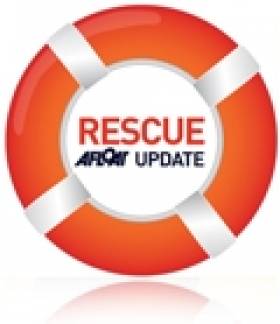Displaying items by tag: Kevin Kershaw
Body of Final Tit Bonhomme Crewmember Recovered
#NEWS UPDATE - The body of the last missing crewmember of the stricken Tit Bonhomme was recovered in Glandore Bay in West Cork on Friday, The Irish Times reports.
The remains of 23-year-old Egyptian national Saied Ali Edlin were discovered floating on the surface to the west of the bay off Long Point, almost a mile from the wreck site and close to a month after the tragedy occurred.
It also comes just two days after the body of skipper Michael Hayes was found close to the mouth of the harbour, as previously reported on Afloat.ie.
The fishing vessel Tit Bonhomme ran aground in rough seas near Adam's Rock, at the mouth of Glandore Harbour, on Sunday 15 January.
Five of the six-person crew - Eldin, Hayes, Attea Shaban (26), Kevin Kershaw (21) and Wael Mohammed (35) - lost their lives when the boat went down.
Only 43-year-old Abdul Mohammed, the brother of Wael Mohammed, survived the sinking after he was able to reach the shore.
"Some of those lost were Egyptian, some were Irish but if you fish the sea, you’re all part of the same family," commented harbour master John Minihane. "We’re all the same, we’re one fishing family and we brought them home.”
The Irish Times has more on the story HERE.
Coastguard 'Overwhelmed' By Response to Glandore Search Appeal
#NEWS UPDATE - The Irish Coast Guard told RTÉ News that it has received an "overwhelming" response from the diving community to its appeal to join the search in West Cork for two missing fishermen.
Skipper Michael Hayes and crewman Saied Ali Eldin are still missing after the fishing vessel Tit Bonhomme ran aground in rough seas near Adam's Rock at the mouth of Glandore Harbour.
Only one of the six-person crew - 43-year-old Abdul Mohammed – is confirmed to have survived. The bodies of Kevin Kershaw (21) and Attia Shaban (26) were recovered last week, while the remains of Wael Mohammed (35) were found by civilian divers near the wreck site last Sunday.
Coastguard manager Declan Geoghegan said that search teams now have the 48 divers required to conduct an exhaustive search of the wreck area and urged further volunteers not to travel for the moment.
The search will concentrate on the waters between Adam's Rock and Long Point, where much of the debris from the trawler has washed up.
RTÉ News reports that more than 200 volunteers are assisting the coastal search by boat and on land, which is being co-ordinated from the village of Union Hall.
Search Continues for Three Fishermen Still Missing in West Cork
#NEWS UPDATE - The search is set to resume again this morning for the three fishermen not yet recovered after their trawler sank off West Cork last Sunday.
Skipper Michael Hayes and Egyptian crewmen Saied Ali Eldin and Wael Mohammed have been missing since the fishing vessel Tit Bonhomme ran aground and went down in rough seas near Adam's Rock, at the mouth of Glandore Harbour.
Only one of the six-person crew, 43-year-old Abdul Mohammed, is confirmed alive after he was able to reach the shore immediately following the incident.
As previously reported on Afloat.ie, Garda divers retrieved the body of Attia Shaban (26) on Thursday morning, followed in the afternoon by that of Kevin Kershaw (21).
Yesterday the search was expanded to cover an 18-mile radius after a dive at the wreck site was unsuccessful, according to The Irish Times.
Divers from the Garda and Naval Service will continue to focus on the wreck today, helped by favourable weather conditions, while volunteers join in the wider search of the coastline.
It emerged on Friday that that boat's aluminium wheelhouse sheared off in the rough seas that followed for three days after it ran aground.
RTÉ News has video of the search operation in progress HERE.
Search Resumes for Missing Fishermen in West Cork
#RESCUE - The search resumed this morning for five men missing after their fishing boat went down in rough seas in West Cork early yesterday, The Irish Times reports.
One of the six-person crew of the Tit Bonhomme was rescued when he was able to reach the shore, after the boat ran aground near Adam's Rock at the mouth of Glandore Harbour.
The missing include skipper Michael Hayes from Helvic Head in Co Waterford, Dubliner Kevin Kershaw (21) and Egyptians Said Mohammed (23), Wael Mohammed (35) and Attea Ahmed Shaban (26).
Abdul Mohammed (43) was airlifted by Irish Coast Guard helicopter to Cork University Hospital, where he is in a stable condition.
As previously reported on Afloat.ie, the fishing boat was returning to its home port of Union Hall early on Sunday in strong force 7-8 southeasterly winds when the incident occurred.
Naval Service and Garda divers were scheduled to search the sunken vessel today after postponing yesterday due to poor light and big swells.
The Irish Times has more on the story HERE.


































































